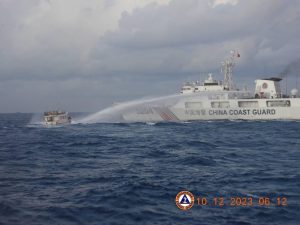President Joe Biden will China about its recent aggressive activity in the South China Sea when he meets later this week with Japanese Prime Minister Fumio Kishida and Philippines President Ferdinand Marcos Jr. in Washington, according to a report in the Financial Times.
According to the report, which cited two senior U.S. officials with knowledge of the summit’s planning, Biden is set to “express serious concern” about the situation around the Second Thomas Shoal, where Chinese vessels have repeatedly harassed Philippine ships seeking to resupply its personnel stationed at the shoal.
The Biden-Marcos-Kishida meeting, the first-ever trilateral summit between the three nations, will be held in Washington on April 11. The summit is an obvious response to the three nations’ shared concerns about China’s growing power and influence, particularly in the South China Sea. As per the White House, the three leaders “will discuss trilateral cooperation to promote inclusive economic growth and emerging technologies, advance clean energy supply chains and climate cooperation, and further peace and security in the Indo-Pacific and around the world.”
This has resulted in a series of dangerous high-seas encounters, including, most recently, the China Coast Guard (CCG)’s ramming of a Philippine Coast Guard vessel seeking to resupply forces stationed on Second Thomas Shoal in the Spratly Islands. The incident also saw the CCG fire water cannons at one of the supply vessels, smashing its windshield and injuring four navy personnel.
The Financial Times reported that Biden will affirm that the BRP Sierra Madre, which the Philippines purposefully grounded on the shoal in 1999, is covered by the 1951 U.S.-Philippines Mutual Defense Treaty. It cited one U.S. official as saying that China’s campaign was “underestimating the potential for escalation.”
“We’ve tried to make that clear in a series of conversations… that our mutual defense treaty covers Philippine sailors and ships and by extension… the Sierra Madre,” the official said. “China needs to examine its tactics or risk some serious blowback.”
Since 2019, U.S. officials have repeatedly assured Manila that an armed attack on any Philippines armed forces, public vessels, or aircraft in the South China Sea would invoke mutual defense commitments under Article IV of the treaty. Previously, there had been some ambiguity about this question, given that the Philippine-claimed regions of the South China Sea were only formally incorporated by Manila in 1978, nearly three decades after the Treaty’s signing.
There appears to be some concern that China’s current loose blockade of Second Thomas Shoal is aimed at seizing control of the feature if and when the Sierra Madre, which is in an advanced state of erosion, crumbles into the sea. China claims that Philippine supply ships are bringing construction materials in order to reinforce the vessel, in violation of a promise it claims Manila made to remove the ship from the shoal. The Philippines has denied ever making such a promise, with the Philippine Department of Defense claiming that the vessel will remain a “permanent station” and that its presence in the Philippines’ “own areas of jurisdiction is an inherent right of the Philippines and does not violate any laws.”
The report about Biden’s warning came on the same day the Philippines held a joint maritime patrol in the South China Sea with the U.S., Japan, and Australia. The patrol, which involved six warships and four aircraft from the four nations, was an expanded form of the patrols that the U.S. and Philippine navies have held since November, in direct response to the growing Chinese assertiveness in the disputed seaway, including around Second Thomas Shoal.
In a joint statement released by defense officials from the four nations, Philippine Defense Secretary Gilberto Teodoro said that bilateral and multilateral patrols were “a step in building our country’s capacity for individual and collective self-defense.” U.S. Defense Secretary Lloyd Austin said the patrol “underscores our shared commitment to ensuring that all countries are free to fly, sail, and operate wherever international law allows.”
China pointedly held a “joint naval and air strategic patrol” in the South China Sea on the same day, with the state media tabloid Global Times accusing the four nations of “stirring up the South China Sea and creating hotspots.”

































